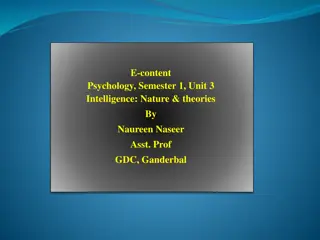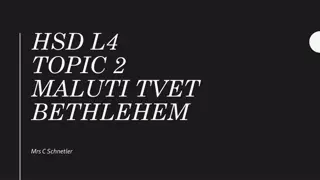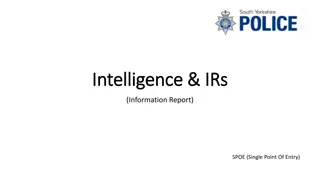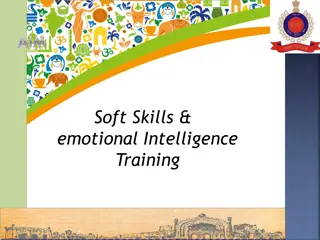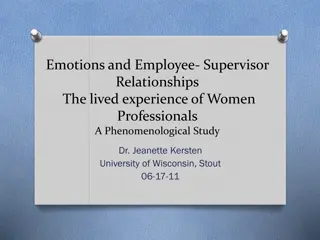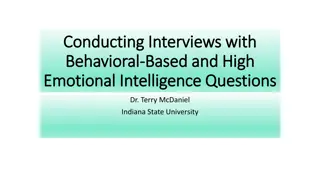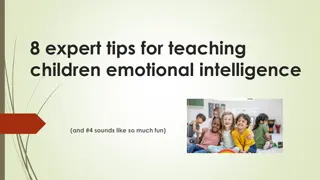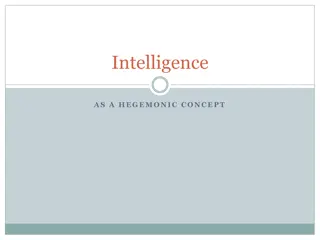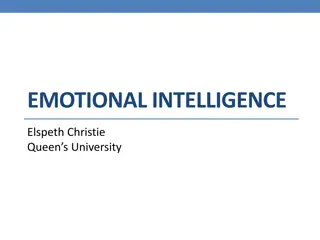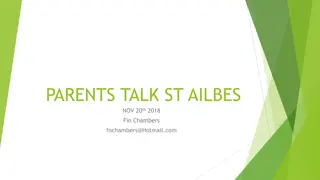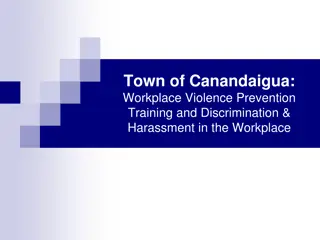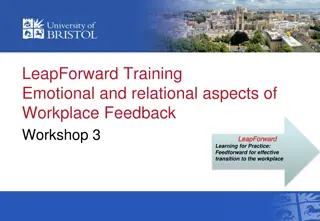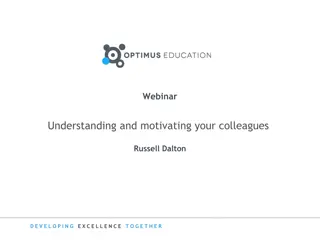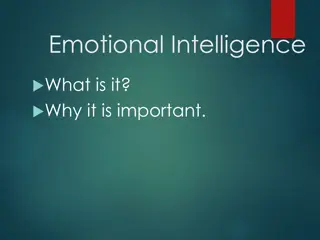Understanding Emotional Intelligence in the Workplace
Explore the significance of emotional intelligence in the workplace, its definition, five competencies, case studies, and strategies to enhance skills. Dive into scenarios, role-plays, misconceptions, and why emotional intelligence is crucial for professional success. Learn about managing emotions, fostering self-awareness, empathy, social skills, self-regulation, and motivation. Discover insights from Daniel Goleman and the case for emotional intelligence by M. Schmidt.
- Emotional intelligence
- Workplace dynamics
- Competency development
- Professional communication
- Employee relationships
Download Presentation

Please find below an Image/Link to download the presentation.
The content on the website is provided AS IS for your information and personal use only. It may not be sold, licensed, or shared on other websites without obtaining consent from the author. Download presentation by click this link. If you encounter any issues during the download, it is possible that the publisher has removed the file from their server.
E N D
Presentation Transcript
Emotional Intelligence in the Workplace Presenter: Vice President, Client Services ESI Employee Assistance Group
Role Play Five employees have been assigned to work on a project and they are having difficulty working together and completing tasks.
Role Play Questions 1. Can you see this scenario happening in the workplace? 2. What could Maureen have done differently? 3. Did Michelle and Phil express themselves in a professional manner? What would you say or do that would be more effective? 4. What can be done about Susan and Patty s behavior?
Training Overview Definition of Emotional Intelligence Why it s Important Misconceptions The Five Competencies: Self Awareness, Empathy, Social Skills, Self-Regulation and Motivation Case Studies Strategies to Increase Skills
How Would You Define Emotional Intelligence?
Definition of Emotional Intelligence The capacity for recognizing our own feelings and those of others, for motivating ourselves and for managing emotions well in ourselves and in our relationships. Includes five emotional and social competencies: Self-awareness Empathy Social skills Self-regulation Motivation *Daniel Goleman - author of Working with Emotional Intelligence
Why Do You Think Emotional Intelligence Is Important?
The Case for Emotional Intelligence Schmidt, M. 2012 Image from talentsmart.com
Misconceptions About Emotional Intelligence It s just about being nice to everyone and thinking positively It means letting emotions run freely, or being completely robotic Women are better at it It s connected with intellectual or cognitive abilities It s fixed or genetic
Self-Awareness Recognize your emotions early on and their effects Know your strengths and limits Have a strong sense of self-worth and capabilities
Self-Awareness Case Study #1 Joe rushed in and interrupted Tonya during a meeting to get information he had been waiting for. In a stressful-demanding tone, Joe stated that he hadn t heard back from Tonya and he must have it before the end of the day. 1. If you were Joe, how would you handle this differently? 2. Should Tonya and/or the meeting members respond or say anything? 3. How do you think Tonya views Joe s behavior? 4. How do you think Joe s interruption was perceived by members of the meeting? 5. How do you think this will effect Tonya and Joe s working relationship?
Self-Awareness Checklist Take time for mental pauses, introspection, and solitary reflection regularly Be attuned to and identify your emotions early on Accept that emotions are normal Exclude negative judgements Ask why Recognize how your emotions shape what you PERCEIVE, THINK, and DO Learn from your experiences and mistakes Recognize where you need to improve Be open to candid feedback and new perspectives Show a sense of humor and perspective about yourself
Internal Dialogue Irrational Thinking Realistic Thinking "I wouldlike him to treat me more respectfully but he's not doing it. So I'll just have to move on from this. As there's no law that says he must treat me respectfully. "He can'tsay that to me he hasto give me more respect!" VS "I absolutely mustdo well on this presentation!" "I want to do well, and I'll be well prepared and do my very best on it." "I have to give this presentation exactly as it's written." "If I miss a line, it won't be the end of the world. The concept is sound and well developed already." Rewrite the thoughts that script your emotions
Empathy Genuinely sense and understand people s feelings and needs Actively listen to others perspectives Sensitive to group differences It is something that you can learn at any age!
Case Study #2 Empathy Mark and Joyce are having a conversation at work. Joyce reports to Mark. This situation I am dealing with has proven to be especially difficult. It s involved exceptionally long hours and it s really tested my patience and stamina. I feel like it s never going to be enough and my main workload is starting to suffer. Frankly, I m exhausted. Mark Joyce Joyce, you know that we re super busy right now and we ve had these crunch times many times before this. Everyone has to go the extra mile here. I m super-stretched too but this is how it works here. If I can t have two days off this weekend, then we all have to grin and bear it. I don t see any way I can help you right now. And it might be some time before we get back to normal. By the way how far along are you on the other project? It has to be completed by Monday.
Empathy Case Study #2 - Questions 1. What was Joyce trying to communicate to Mark, and what did she want from him? 2. What do you think was going through Mark s mind? 3. How do you think Joyce reacted to Mark s comments, and what will she think as a result of this conversation? 4. How would you handle this differently? If you were Mark, what would you say instead? 5. Do you think it s possible to express too much empathy? 6. Is it possible to pretend to be empathetic? 7. How can you learn to be empathic even if it s not your natural tendency?
Empathy Checklist Acknowledge feelings first, and let the other person know they have been heard (even if you can t change the situation) View the situation from the standpoint of the other person Probe and listen to hear what s important Verbalize and/or normalize their concerns Show you take the other person seriously by making eye contact or nodding As a supervisor/mentor, give timely coaching, and offer assignments that challenge and foster a person s skills
Social Skills Nurture instrumental relationships Build rapport and keep others in the loop Work with others towards a shared goal Find common ground Be persuasive
Social Skills Case Study #3 Emily s boss, Kate, has asked that she partner with Ron, the most negative employee in the department. How should Emily respond? 1. Roll her eyes, sigh, and say Okay, whatever. 2. Ask her boss for strategies on how to collaborate best with Ron based on his working style. 3. Have a discussion with Ron letting him know she doesn t want his negativity to affect the project. 4. All of the above.
SocialSkills Case Study #3 - Questions 1. How could Kate, Ron s boss, approach him about his negativity? 2. How could Ron help himself to be perceived as less negative? 3. How can Emily be more effective in dealing with Ron?
Social Skills TrueorFalse? Having strong social skills and being easy to talk with are both signs of high emotional intelligence.
Social Skills Checklist Value others Balance a focus on task with as much attention to relationships Collaborate and openly communicate Promote a friendly, cooperative climate Share credit with team members Handle and influence other people s emotions effectively
Self-Regulation Managing disruptive emotions and impulses effectively Flexibility in handling change and challenges Being open to new information or perspectives
Case Study #4 Self-Regulation Amy receives an email stating that she will not be able to take vacation time when she requested it. Amy kicks her desk and immediately turns to Jason, her co-worker that sits next to her and says loudly: I just received a nasty gram from that jerk in benefits saying that I can t take vacation time. This is ridiculous! I am a senior employee and should be able to take time off when I want too! This sucks!! Jason agrees with Amy, and they continue discussing their complaints for a while getting more and more riled up. Questions: 1. If you were Amy, how would you handle this? What about Jason? 2. How do you think their conversation will effect the rest of the co-workers that can hear them? 3. What other consequences do you anticipate this can cause in the short and long term?
Self-Regulation Alternate Case Study Sandra, the director of the department enters the conference room where several employees are sitting and waiting to discuss a customer service issue. Sandra is visibly upset with a red splotchy face. She begins with a litany of questions for everyone, and doesn t hold back. What would be the best response by an employee: 1. Gary fumbles and stutters while trying to explain the reasons for the mistakes. He blames another department for the issue. 2. Amy keeps quiet and hopes Sandra calms down soon. 3. Helen looks at Sandra and addresses her clearly in an even tone, acknowledges the problem, and calmly explains the situation. 4. Dylan silently fumes and thinks of ways to get back at Sandra. 5. Rose defensively says Sandra please calm down. This isn t a big deal. Everyone here works very hard with our customers, and I don t understand why you are so angry.
Self-Regulation Learn to balance between the rational and emotional centers of the brain.
Motivation Strive to improve or meet a standard of excellence Personal drive to achieve goals Show initiative and optimism
Motivation Case Study #5 Lately Eduardo has been dealing with a lot of changes at work, de-moralized co-workers, and some personal problems at home. This past week, Eduardo has noticed that he hasn t been his usual self, and that it is probably impacting others. Eduardo reminds himself that his role in the organization is really important, and that many people depend upon him. This helps Eduardo to begin to get back on track. 1. What are some other strategies that Eduardo can use? 2. What are the characteristics of a motivated person? 3. What can you do to stay motivated if there are barriers like organizational change?
Motivation Checklist Develop a sense of personal satisfaction/fulfillment from being interested in what you are doing Seek out other motivated individuals Use realistic self talk and remind yourself of previous positive experiences Set challenging goals and take calculated risks Persist despite setbacks -- which are viewed as a manageable circumstance Operate from hope of success Know when to access outside resources or help to get back on track
Emotional Competencies Successful Failure Composed and calm under pressure Self-Control Moodiness and angry outbursts Taking responsibility, fixing the problem and quickly moving forward Acting defensive, covering up and assigning blame Conscientiousness Undermining the process and trying to get ahead at any cost High integrity and concern for others Trustworthiness Empathic, tactful and show consideration Lack empathy, abrasive, arrogant, and/or intimidating Social Skills Insensitive and manipulative Cooperative and appreciate diversity Building Bonds


